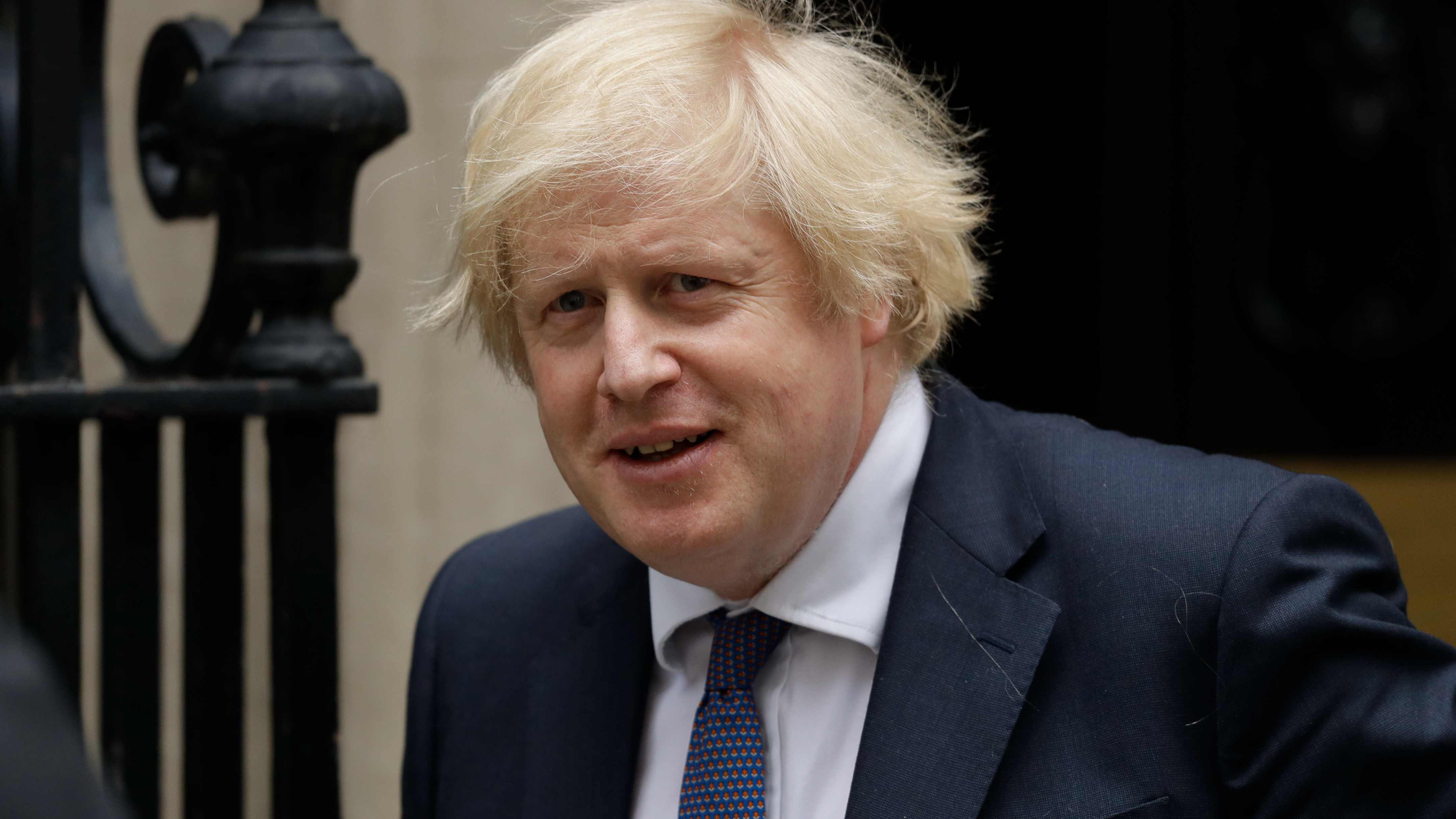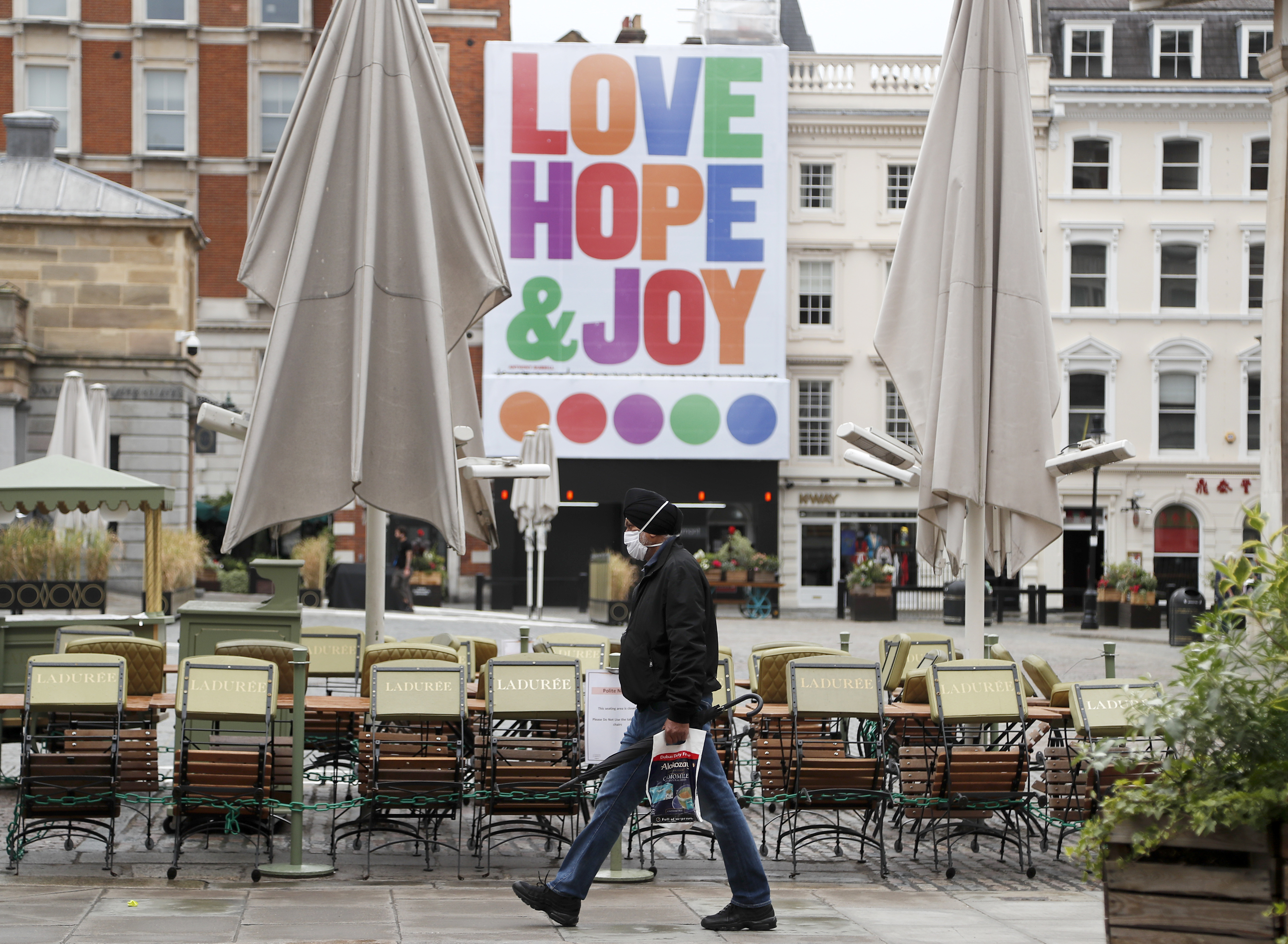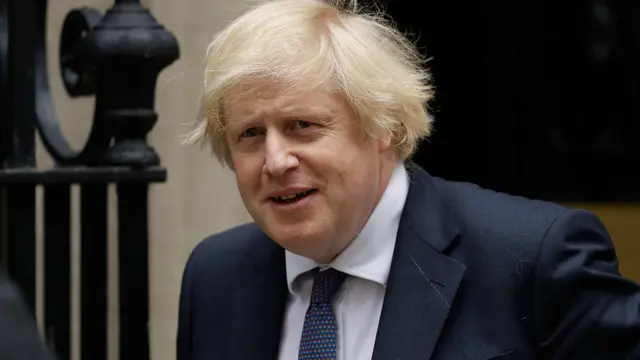
British Prime Minister Boris Johnson leaves 10 Downing Street in London to attend the weekly Prime Minister's Questions at the Houses of Parliament, in London, Wednesday, July 1, 2020. /AP
**Editor's note: **Keith Lamb is a University of Oxford graduate with an MSc degree in Contemporary Chinese Studies. His primary research interests are international relations of China and China's "Socialism with Chinese Characteristics." The article reflects the author's opinions, and not necessarily the views of CGTN.
From the liberal lens that presents the complexities of international relations as being one of the "naughty" versus the "nice," Boris Johnson's offer of citizenship to 3 million Hong Kongers might seem to be an offer formed out of altruism.
This offer will be framed in a righteous warm glow (and no doubt earnestly felt by many). However, beyond the grandstanding, where calls for democracy and human rights are instrumental, lies a decidedly more malevolent structural force.
For Britain's transnational neoliberal elites, who have a foothold in both the Conservative and the Labour Party, Hong Kong has always served as a key geographical location in their strategy to undermine China and the working people of Britain too.
With the opening up of China in the 1970s, Hong Kong served as the key port of entry for neoliberal capital as well as for the export of finished products. For China, the use of the market was for developmental purposes. Efficient, well-disciplined Chinese labor was exchanged for the technical know-how needed to defeat poverty.
Western capital, the central force in neoliberalism hungry for profit, clamored to shift production into China. At the same time, this move was meant to undermine China's political-economic system as well as democracy in their home states.
It was theorized by neoliberal academics, encapsulated in Fukuyama's "End of History Thesis," that China's use of the market would lead to insurmountable contradictions such as uneven development, pollution, corruption, and class polarization.
The only way to overcome these contradictions, so it was strategized, was through the use of mass elections acting to open the pressure valve of discontent. Here, transnational private capital would take hold of the state's industries and the mass media. With these tools, the business classes could capture political parties and justify the imposition of liberal democracy.
In Britain, as in many other advanced capitalist economies, their elites feared the democratic gains made by the workers after World War Two. In Britain, with the collapse of the empire, workers had established the welfare state and their source of power lay in traditional industry.
British capital formed a transnational alliance, known as neoliberalism, to defeat the gains made by their citizens. Through a well-coordinated campaign, which co-opted academics and lobbied governments, state industries were privatized and manufacturing work was shifted out of Western states away from the power of the masses.
Clearly, there was no altruism shown by Britain's elites for the rights of the British worker and neither was there any to spare for the Chinese worker who was expected to work even harder and for less.
Had it not been for Hong Kong, this brief history, given the marketization of China paralleled with the de-industrialization of Britain, would have been difficult if not impossible.

A man walks past a closed outside space of a restaurant in Covent Garden, London, Tuesday, June 30, 2020. /AP
Today, Hong Kong continues to serve as a key geographical location for Britain's endeavors to both "batter down Chinese walls" while at the same time disciplining its own working class. The invitation of 3 million Hong Kongers to the UK is representative of this dual cudgel.
At this historical juncture, the end of history thesis has not come to be. China has kept its independence and has made huge advancements in poverty alleviation, green technology, and anti-corruption.
Evidently, Britain was more than able to deal with the China when China was poor and corruption was rife. Now the success of an independent China has led to a strategic change by certain elites who now attempt to single-handedly ignite "Cold War Two." Consequently, China's progress has led to politicians in the UK fanning the flames of discontent in Hong Kong.
It is in this context that the invitation of 3 million Hong Kongers takes place today. It is a strategic invite designed to further irritate Beijing and divide Hong Kong. There is no altruism here as well evidenced by Britain's lack of invite pre-1997 before Hong Kong returned to China.
For the established British population, importing a well-disciplined Chinese labor force from Hong Kong will further increase pressure on resources and jobs. This will lead to further cleavages among an already fractured British "peoples" making united democratic action difficult.
This continuation of divide and rule, a favored imperial tactic of the British Empire, has been one prominent after the empowerment of the post-World War Two British working class. It has bought the masses affected by Britain's foreign policies into the belly of the beast.
Those who seek a better life come from Britain's former impoverished colonies and states hit by neoliberal wars such as Afghanistan and Libya. Importantly, democratic approval for mass immigration and imperial foreign policy, which serves as the source of this mass immigration, has always been denied to Britain's "hoi polloi."
As with previous waves of immigrants, many of the existing citizens of the UK will be unable to see the machinations of their own elites at work and instead, they will identify with these established elites in an attempt to maintain a sense of cultural integrity.
Indeed, such jingoism and fractures serve not only to divide at home but also serve to reinforce belligerent sentiments towards foreign powers when needed.
Marx had witnessed this same phenomenon, writing in a letter in 1870: "Every industrial and commercial center in England now possesses a working class divided into two hostile camps, English proletarians and Irish proletarians. The ordinary English worker hates the Irish worker as a competitor who lowers his standard of life."
As is often the case with the perception of an overburdened welfare state, the Right will call for it to be dismantled and health care privatized, which is exactly what the neoliberal elites want. The Left will rightly continue to work hard to bridge over cultural and racial divides, and liberals will salute the ensuing chaos, at home and abroad, as progress towards the end of history.
(If you want to contribute and have specific expertise, please contact us at
.)
 简体中文
简体中文





